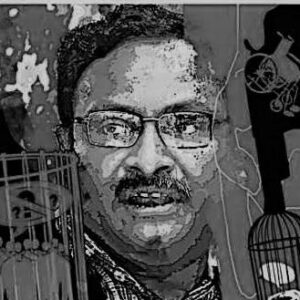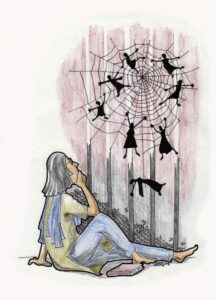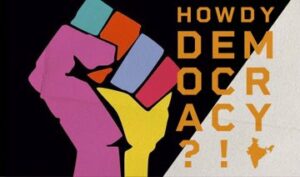
G.N. Saibaba’s 2017 Prison Letter Sheds Light on the Rights of Disabled Prisoners
17/10/2024
The Wire / by Sukanya Shantha
‘I have refused to be carried to a government hospital outside the prison because I was once treated like baggage.’
Professor G.N. Saibaba wrote a letter to disability rights activist Muralidharan from Nagpur central prison in October 2017.
It had been only a few months since Saibaba, a wheelchair user with over 90% disability, was handed a life sentence under the Unlawful Activities (Prevention) Act.
Read more

‘Failing to grasp’ his immense pain, would GN Saibaba’s death haunt judiciary?
16/10/2024
Counterview / by Vidya Bhushan Rawat
The death of Prof. G.N. Saibaba in Hyderabad should haunt our judiciary, which failed to grasp the immense pain he endured. A person with 90% disability, yet steadfast in his convictions, he was unjustly labeled as one of India’s most ‘wanted’ individuals by the state, a characterization upheld by the judiciary. In a democracy, diverse opinions should be respected, and as long as we uphold constitutional values and democratic dissent, these differences can strengthen us.
Read more
People, politicians pay last tributes to Sai Baba
15/10/2024
Times of India / by TNN
“Long live, long live, Sai Baba long live” slogans reverberated as people paid tributes to the former Delhi University (DU) professor GN Sai Baba on Monday. Sai Sai Baba died on Saturday while undergoing treatment for a gall bladder ailment at Nizam’s Institute of Medical Science (NIMS).
Read more
A Decade In Jail And A Death Foretold
15/10/2024
Free Press Journal / by FPJ Editorial
The death of G N Saibaba at the age of 57 is a severe indictment of the political system and the judiciary of the country that kept the wheel-chair bound academic incarcerated for nearly 10 years under the draconian Unlawful Activities Prevention Act until he was finally acquitted of all charges by the Nagpur bench of the Bombay High Court earlier this year.
Read more
GN Saibaba death: UAPA has no place in a democracy | Mihir Desai Inverview | Pooja Prasanna

en | 21:40 | 2024
Former Delhi University professor and activist Dr GN Saibaba, who had become a symbol of state repression, passed away on Saturday, October 12, at the age of 58. This comes just seven months after his acquittal in a UAPA case which alleged that he was involved with Maoists.
…TNM’s Pooja Prasanna spoke to senior advocate Mihir Desai on Dr Saibaba’s death, UAPA and indian prisons. Mihir Desai as been the legal counsel for many who have faced UAPA including Father Stan Swamy and Dr Saibaba
Watch video
G N Saibaba was killed by wrongful imprisonment and medical neglect
14/10/2024
Peoples Dispatch / by Peoples Dispatch
Human rights defender and academic G N Saibaba was over 90% handicapped and during his years in prison was repeatedly denied bail by the courts and denied timely treatment for his various medical issues.
Human rights defender and academic, G N Saibaba (57) died on Saturday, October 12 at Nizam Institute of Medical Sciences Hospital in Hyderabad due to cardiac arrest. His death took place merely seven months after being released from a decade of wrongful imprisonment in Indian jails.
Read more
When the state turns rogue even protests dry up, Salutes & Apologies Professor Saibaba!
14/10/2024
Sabrangindia / by Teesta Setalvad
If there is one unique and malevolent achievement of the present Indian state in its third, albeit less armoured term, it is, how it has through its venal acts, battered down alliances and voices of protest; GN Saibaba’s death after a long and deliberately negligent incarceration is the latest of one such
Read more
GN Saibaba’s death puts spotlight back on plight of incarcerated activists
14/10/2024
The Federal / by The Federal
Dissent is not easy in India. After his acquittal this March, Saibaba publicly said he was repeatedly tortured and subjecte to abuse while in prison
The demise of former Delhi University professor and human rights activist GN Saibaba in Hyderabad on Saturday (October 12) has once again put the spotlight on the alleged injustice and torture being faced by the activists who are in prison under various charges like having links with Maoists.
Read more
Stan Swamy parallel in former DU professor Gokarakonda Naga Saibaba’s death after 10-year jail
14/10/2024
The Telegraph / by Pheroze L. Vincent
A polio patient, Saibaba was paralysed below his waist and developed life-threatening complications in his Nagpur prison that he blamed on poor living conditions and inadequate medical treatment. Saibaba had gone on hunger strike several times in protest
Former Delhi University professor Gokarakonda Naga Saibaba, a paraplegic acquitted seven months ago after spending a decade in jail on terror charges, died on Saturday of complications following gall bladder surgery at a Hyderabad hospital. He was 57.
Read more
The National Platform for the Rights of the Disabled expresses deep shock and profound anguish at the untimely death of Dr. G N Saibaba
13/10/2024
Countercurrents / by National Platform for the Rights of the Disabled (NPRD)
The National Platform for the Rights of the Disabled expresses deep shock and profound anguish at the untimely death of Dr. G N Saibaba.
It was just a few months ago that he was released after being incarcerated for ten long years. He was implicated in false cases and had to continuously wage legal battles before finally being acquitted by the Supreme Court. Unfortunately, it was a freedom that was short-lived.
Read more
Saibaba’s Death Was Institutional Murder by the Centre: Activists
13/10/2024
Deccan Chronicle / by DC Correspondent
Rights activists and political parties termed the death of Prof. G.N. Saibaba as institutional murder resulting from his incarceration for nine years. They drew parallels with Father Stan Swamy, an 84-year-old Jesuit priest and tribal rights activist, who died in hospital while in custody after being denied basic needs like a drinking straw and sipper.
Read more
G.N. Saibaba’s Life Is Not Just a Chronicle of His Times, but Also What the Times Refused to Chronicle
13/10/2024
The Wire / by Saroj Giri
He was just letting us back into his life after all the pain and suffering he had endured. And then he was taken away.
We must now think of Saibaba as someone who could not finish telling us his story. We must have imaginary conversations with him, so that we can hear him. We gasped for Father Stan Swamy, for Pandu Narote, to commune with them. Now, we are gasping for Saibaba, who has been snuffed out of our lives so suddenly.
Read more
Prof G N Saibaba a victim of our insensitive system
13/10/2024
Countercurrents / by Vidya Bhushan Rawat
The death of Prof G N Saibaba in Hyderabad yesterday should haunt our judiciary which were unable to rise up and understand the pain he was going through. That a person with 90% disability yet full of convictions was made as India’s most ‘wanted’ person by the state, equally endorsed by the judiciary as well. I have mentioned it many time that in democracy people might have divergent views and as long as we have faith in constitutional values and democratic dissent, these views ultimately strengthen us.
Read more
▪ Video: State’s Job is to Serve People, Not Punish Them: G N Saibaba

en | 38:33 | 2024
Newsclick / by Newsclick Team
Former DU professor G.N. Saibaba, who passed away in Hyderabad on Saturday, had recounted his harrowing ordeal during 10 years in jail at a press conference in New Delhi in March this year.
Watch video
Also read:
▪ Some personal reflections on prison medical care (The Leaflet | Vernon Gonsalves | Apr 2024)
▪ Was the trial judge who convicted G.N. Saibaba biased? We will never know, and that is part of the injustice (The Leaflet / March 2024)
▪ ‘It Is Only by Chance That I Came Out of Prison Alive’: G.N. Saibaba (The Wire / March 2024)














